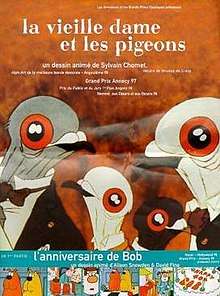The Old Lady and the Pigeons
The Old Lady and the Pigeons (French: La vieille dame et les pigeons) is a 1997 animated short film written and directed by Sylvain Chomet. It tells the slightly surreal story of a starving policeman who dresses up as a pigeon and tricks an old lady into feeding him. The film was produced through the French company Les Armateurs with support from companies in Canada, Belgium and the United Kingdom. It was Chomet's debut film and won several awards including the Grand Prix at the Annecy International Animated Film Festival.
| The Old Lady and the Pigeons | |
|---|---|
 Theatrical release poster | |
| Directed by | Sylvain Chomet |
| Produced by | Didier Brunner Bernard Lajoie |
| Written by | Sylvain Chomet |
| Music by | Jean Corti |
| Edited by | Chantal Colibert Hélène Girard |
Production company | |
| Distributed by | Les Grands Films Classiques |
Release date |
|
Running time | 24 minutes |
| Country |
|
| Language | English |
Plot
An emaciated Parisian policeman discovers an old lady who feeds pigeons in the park excessively. After having a nightmare ending in giant pigeon-men pecking at his stomach, the policeman constructs a pigeon mask, which he wears to the old lady's home. She welcomes him inside and, despite his rude behavior, allows him to gorge himself. As weeks pass, the policeman grows increasingly fat. As he goes up flights of stairs to the woman's home each day, he passes a maid sweeping the floor.
Eventually, the policeman discovers the old lady's other pet: the woman who swept the floor, dressed as a cat. When the old lady spots the police man, she begins to pursue him with a large pair of shears. He tries to remove his fake pigeon head, to reveal himself as human, but it has become stuck around his neck. As the old lady is cornering him, the policeman falls out the window and onto the street, among a small group of pigeons. In the final scene the policeman, skinny once more and without his pigeon suit, is seen behaving like a pigeon in front of the Eiffel Tower.
Dialogue
In Tati-esque fashion, the bulk of the film is without any dialogue at all. And what there is in English: supplied by overweight American tourists in the opening and closing scenes.
Production
Sylvain Chomet had been based in London and worked as an animator in advertisement since the 1980s. He returned to his native France in 1990 and, inspired by Nick Park's Creature Comforts, set about making his own film.[1] Chomet pitched The Old Lady and the Pigeons to Didier Brunner, producer at Les Amateurs, with whom he began to work on the film in 1991. The producers had difficulties raising enough money, but decided to start anyway, with money from the National Center of Cinematography. The backgrounds were designed by Nicolas de Crécy, who had studied with Chomet and previously collaborated on comics projects. The team produced the film's first four minutes at the Folimage studios in Bourg-lès-Valence. They then attempted to use the finished footage to attract more investors, but failed. In 1993 Chomet relocated to Canada in hope of a fresh start; however, Brunner suddenly managed to pre-sell the film to the BBC and several other broadcasters, and production could continue.[2] Five years after production started the film was completed.[1]
Reception
The film competed at the 1997 Annecy International Animated Film Festival. On 27 May 1998 it was released theatrically in France through Les Grands Films Classiques. It was screened together with the animated short film Bob's Birthday, directed by Alison Snowden and David Fine.[3] Bernard Génin reviewed The Old Lady and the Pigeons for Télérama and called Chomet's directing "brilliant". He also complimented Crécy's background art, and wrote: "Paris streets, cozy interiors, characters' puffy faces – each shot is a beauty! Yes, the traditional, handmade cartoon can still surprise us."[4]
Accolades
The film won the Grand Prix for best short film at the Annecy Festival. It went on to win the British BAFTA Award and Canadian Genie Award for Best Animated Short. It was nominated for best animated short at France's 1998 César Awards, and the United States' Academy Award for Best Animated Short Film at the 70th Academy Awards.[5]
| Event | Award | Outcome |
|---|---|---|
| 70th Academy Awards | Best Animated Short Film | Nominated |
| 1999 Algarve International Film Festival | Grand Prize of the City of Portimão | Nominated |
| 1998 Angers European First Film Festival | Audience Award, Short Film | Won |
| European Jury Award, Short Film | Won | |
| 1997 Annecy International Animated Film Festival | Grand Prix, Best Animated Short | Won |
| 50th British Academy Film Awards | Best Animated Short Film | Won |
| 1997 Cartoon Forum | Cartoon d'or | Won |
| César Awards 1998 | Best Short Film, animation | Nominated |
| 18th Genie Awards | Best Animated Short | Won |
| 1998 Hiroshima International Animation Festival | Grand Prize | Won |
| 1997 World Animation Celebration | Grand Prize | Won[5] |
References
- Notes
- Lenburg 2006, p. 45
- Foley, Jack. "Belleveille Rendez-vous - Sylvain Chomet Q&A". IndieLondon. Retrieved 20 July 2011.
- "La Vieille Dame et les pigeons". leparisien.fr (in French). Retrieved 23 July 2011.
- Génin, Bernard (1998). "La Vieille Dame et les pigeons". Télérama (in French). Retrieved 23 July 2011.
Rues de Paris, intérieurs douillets, trognes des personnages : chaque plan est une splendeur ! Oui, le dessin animé traditionnel, fait main, peut encore nous étonner.
- "La Vieille Dame Et Les Pigeons". Big Cartoon DataBase. Retrieved 20 July 2011.
- Bibliography
- Lenburg, Jeff (2006). Who's who in animated cartoons. New York, NY: Applause Theatre & Cinema Books. p. 45. ISBN 978-1-55783-671-7.